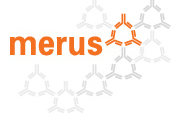News
Company News: Merus Receives EP Patent Covering the Expression of Defined Antibody Combinations

Merus B.V., a biopharmaceutical company focused on multispecific human antibody therapeutics, announced today that it has been granted the first European patent covering its Oligoclonics® technology from a patent family that already comprises 4 issued US patents. The Oligoclonics® technology entails the manufacturing of at least three antibodies with different specificities by a single production cell line, thereby providing for combinations of human antibodies as a single therapeutic.
It has been demonstrated in clinical trials and disease models that combinations of antibodies are more efficacious than therapies based on single monoclonal antibodies alone. The Oligoclonics® technology is designed to provide important developmental and therapeutic value. It offers a platform for the stable, high-yield production of fully human, natural IgG antibody combinations by a single cell line using strategies currently exploited for conventional monoclonal antibodies in a manner that is cost-effective and acceptable to regulatory authorities.
“The therapeutic antibody field is moving towards combination therapies, either by combining individual monoclonal antibodies or by applying bispecific formats, to overcome the limited potency of monoclonal antibodies often observed in indications like oncology,” said Ton Logtenberg, CEO of Merus. “The Oligoclonics® technology provides a platform that allows for the cost-effective development and manufacturing of multispecific combinations of antibodies with more potent clinical effects. The key to the Oligoclonics® technology is that all antibodies produced by the clonal manufacturing cell line share a common light chain (cLC). With our recent announcement of MeMo®, a transgenic mouse for the generation of human cLC monoclonal antibodies, we are complementing our technology base with the aim to expand our pipeline of innovative cLC antibody products.”


